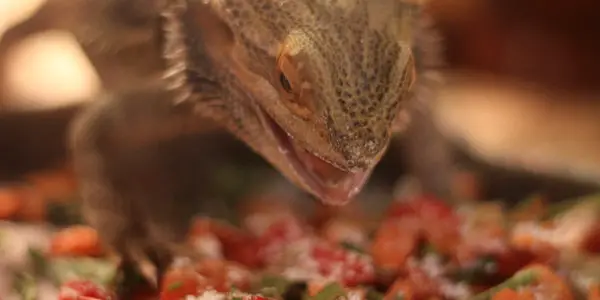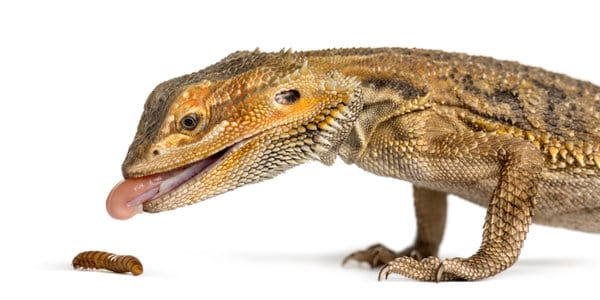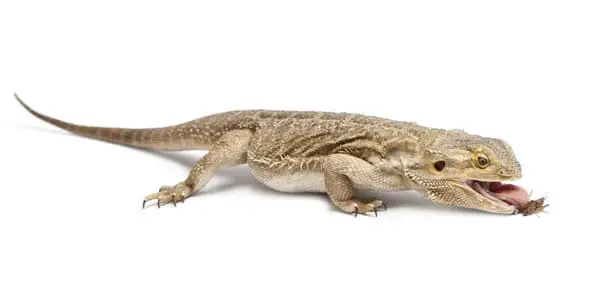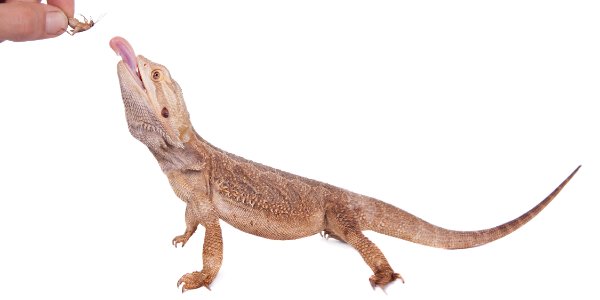Aside from cricket, baby bearded dragons can eat different variety of foods. Baby berries need to consume more proteins. They can ad different insects such as locusts and super worms as well. Baby bearded dragons also need to eat a few leafy greens to complete their diet. It should be composed of veggies and more insects to help them grow.
For adult bearded dragons, they should be fed mostly leafy greens and other vegetables. A small part of their diet shouldn’t be consist of proteins from insects.
They can eat dubia roaches and other live foods. Insects are highly nutritious for bearded dragons. Therefore it’s a good idea to feed it to them.
Beardies can eat a wide variety of foods which makes them easy to care for than other pets. But you have to monitor their food intake to avoid being overfed.
It’s not good for their health since they can’t get as much exercise compared to wild bearded dragons.
When your beardie is older, avoid feeding it with much meat. It will cause your pet to gain weight or even become obese.
It’s going to be detrimental to its health. Older bearded dragons are less active which can cause them to get fat. Instead, feed them more leafy greens to balance their nutrition.
What Food Bearded Dragons Can Eat?
1. Leafy Greens
It’s the best food to feed bearded dragons, especially dark leafy greens. These are easy to find and also nutritious for your pet. It’s packed with vitamins and calcium that beardie needs to stay healthy.
Leafy greens are essential for your beardie’s diet and you must feed them a variety of greens. It helps with their digestion too and avoids constipation.
Below are some examples of leafy greens that you should free your pet.
- Watercress
- Endive
- Collard Greens
- Dandelion Greens
- Turnip Greens
- Escarole
What to Feed Bearded Dragons Aside from Fruits?
Vegetables should be fed to bearded dragons aside from fruits. It’s an important part of their diet. You should begin incorporating veggies into your beardie’s diet as a baby.
That way, you will know what vegetables it prefers. Baby beardie’s diet must consist of 20% of vegetables while adults need 80%.
It’s important to know the vegetables that are good for your pet and what to avoid. Although humans eat a variety of vegetables, not everything is fine for your bearded dragons.
Make sure to also provide your pet with fresh veggies instead of the frozen variety. It can lose its nutritional value if it’s no longer fresh.
- Sweet potato
- Ocra
- Butternut squash
- Yellow squash
- Parsnips
2. Feeder Insects
These are some examples of feeder insects that you can feed your bearded dragon. It’s a must to buy them from a breeder.
That will avoid possible parasites or diseases. It can be passed to your beardie if your pet eats them. You should also learn how to keep these feeder insects.
Find a container to store them since they can escape. It can be a nuisance when that happens. Look for a critter keeper container that is made of plastic or other materials.
Keep the insects in a place with a consistent temperature. Feed them nutritious food as well which you can buy from breeders.
- crickets
- dubia roaches
- earthworms
- locusts
- redworms
How to Feed Bearded Dragons?
When feeding your bearded dragon, you have to cut their food into small pieces. It’s very important to make sure it’s not bigger than the area between their eyes.
It will prevent putting too much pressure on your beardie’s spine. It can cause health issues and it may not be able to move around.
However, feeder insects cannot be cut into small pieces. You can buy the right size of feeder insects for your beardie instead.
Bearded dragons can get water from the food they eat such as veggies. But you still have to provide water to your pet to stay hydrated. Most beardie owners provide their pets with a water bowl to drink and soak in.

What Foods You Should Feed Bearded Dragons Less Often?
There are many types of foods that you can feed a bearded dragon. But not all of them are safe to feed your pet.
Some can be used as a treat or snack for them occasionally. It also depends on what your beardie prefers to eat. The vet can also advise about what food is safe to feed your bearded dragon.
1. Fruits
Fruits can be used as a treat for your beardie. But it’s not necessary for them to consume. It contains high sugar content which is not healthy for you pet.
If you want to add fruits to your beardie’s diet, make sure to only give it as an occasional treat. Never offer fruits every day or make them a part of their meals.
Some fruits cant be easily digested by bearded dragons. Always keep it in mind to avoid causing harm to your pet.
Also, take note that you need to peel the skin of the fruit first before feeding it to your beardie. Don’t forget to cut them into small pieces to avoid choking and other health issues.
Below are the fruits that you can offer bearded dragons. Keep this list to ensure the safety of your pet at all times.
Remember, you should only offer these fruits occasionally. Bearded dragons may get obese and develop different health issues. Feed bearded dragons these fruits sparingly and occasionally.
- Papayas
- Bananas
- Pears
- Kiwi
- Cantaloupe
2. Vegetables
Vegetables are an important part of the bearded dragon’s diet. But it doesn’t mean that you can feed any kind of veggies to your pet.
Some of them should only be fed less often than others. Some vegetables should be given to beardies occasionally as well. Below are some veggies that you should feed less often.
- Cucumbers (peeled)
- Pumpkin
- Zucchini
- Beets
How about spinach? Technically, you can feed bearded dragons spinach. But make sure to only offer spinach to your pet occasionally. Spinach absorbs calcium which is a bad thing for bearded dragons.
These reptiles need calcium to keep their bones healthy. Frequently feeding your beardie spinach can cause health issues for them.
What Foods to Avoid Feeding Beard Dragons?
Beardies are very flexible pets when it comes to their diet. They can eat almost anything since they are omnivores.
They can eat insects and plant materials. But some food can be toxic for your bearded dragon. These foods must be avoided at all times it can be fatal for the beardie.
Some foods can be fed to your lizard in small quantities and are less frequent. That will not harm them if fed sparingly and just occasionally.
But some foods are not ideal to be fed to your bearded dragon. It’s best not to try it out anymore since it can cause them health concerns.
1. Avocado
It’s a healthy and tasty treat for humans but not for pets. Bearded dragons should not be fed avocado since is bad for them. A huge amount of oxalic acid is present in avocado.
That means it’s fatal for bearded dragons when consumed. Instead of feeding this to your beardie, find different fruits and vegetables they can eat instead.
2. Rhubarb
Rhubarb should be avoided by bearded dragons. It may be tasty for humans but it contains oxalic acid. Anthraquinone glycosides are also present in rhubarb which is poisonous for beardies.
When your lizard accidentally eats rhubarb, provide it some water immediately and go to the vet.
3. Iceberg Lettuce
Luckily, iceberg lettuce is not toxic or poisonous for beard dragons. If you like to offer your pet some lettuce, you still can but only in small quantities.
That will ensure that it will not have a bad effect on your dragon. You can give it as a treat to your pet.
Iceberg lettuce doesn’t have any nutritional benefits for beardies. Instead, it can cause health issues such as diarrhea.
It has high water content and it can be bad if given in large quantities. Avoid feeding lettuce to your bearded dragon if there are other options.
4. Fireflies
Bearded dragons usually eat insects and they get their protein from them. But fireflies are poisonous for bearded dragons.
Make sure you never feed your pet fireflies since it’s fatal for them. It cant be given as a treat because of that concern. Pay attention to your beardie when it’s eating. Make sure it will not accidentally eat a firefly.
5. Citrus Fruits
Citrus fruits should not be fed to bearded dragons. Grapefruits, oranges, tangerines, and lemons in particular.
Citric acids on these fruits can have a bad effect on bearded dragons’ digestive systems. Never feed these types of fruits to your pet. There are other fruits that you can provide your beardie as a snack.
6. Insects from the Wild
Avoid feeding your bearded dragon insects that have been caught in the wild. It’s not advisable to catch your own feeder insects.
That can be bad for your beardie since these wild insects are exposed to all elements. Insects from the wild may have diseases that can be passed on to bearded dragons.
Paradise’s and chemicals may also be present with these insects. It can be toxic for your beardie when they eat that insect.
Make sure to purchase feeder insects in a reputable breeder instead. This will ensure the safety of your pet instead of catching food outside.
7. Mushrooms
Mushrooms should be avoided and they should not be fed to your bearded dragon. It may contain poison or other toxins that can be fatal for your beardie.
It’s best to stay away from mushrooms when it comes to feeding bearded dragons to be safe.

What is the Difference Between Baby and Adult Bearded Dragons Diet?
How much to feed and what to feed your bearded dragons depends on their age. Baby bearded dragons don’t have the same nutritional needs as their adult counterpart.
Adult bearded dragons have different needs than babies as well. That’s why having a baby beardie requires more time and effort.
Depending on the age of your bearded dragon, you have to ensure to provide their nutritional needs.
For baby dragons, they need to have supplements, fat, and protein on their diet. It will help their growth and development. While the adult bearded dragons don’t need much food. They only need to maintain their health.
READ NEXT: What Do Bearded Dragons Eat? Ultimate Guide
What’s the Baby Bearded Dragons Required Diet?
When it comes to the baby bearded dragon’s diet, they need to have enough calcium, vitamin D3, and other nutrients.
They need to have those essential nutrients to grow healthy. Make sure to provide your baby beardie supplements and gut-loaded feeder insects every day.
These supplements can be found in local pet stores. Just make sure that they have these supplements specially made for lizards.
It’s also vital to have your baby bearded dragon have its routine checkups from the vet. It will ensure that your pet is having the right amount of nutrients it needs.
The baby bearded dragons diet mostly consists of meat such as insects. They need to have as much protein they can get. It will help with their growth and development.
This will ensure that they are strong and healthy as they grow. That’s why baby berries are always hungry and need to be fed more frequently.
Feed your baby bearded dragon at least once every day. Allow them to each as much within 15 minutes.
Make sure to get feeder insects from a trusted breeder or pet store. Never catch insects from the wild. It may have parasites or chemicals in them. That will be bad for your baby bearded dragon’s health.
Note that 20% of the baby bearded dragons’ diet must include vegetables as well. Don’t let your baby beardie just eat insects.
They have to eat some vegetables to have a balanced diet. It’s important to include veggies together with feeder insects. Make sure to feed fresh vegetables to your baby beardie.
What’s the Adult Bearded Dragons Required Diet?
Adult bearded dragons are easier to care for. They don’t require too much hassle compared to taking care of a baby beardie.
If you’re a beginner, it’s best to start with an adult bearded dragon first. They don’t get hungry as often as the baby bearded dragons. Feed them once a day and they should be fine.
Adult beardies don’t need to eat too much meat as well. That means you don’t need to have as many feeder insects to keep. Their diet should be 20% insects and 80% vegetables. As they grow older, you should try to offer them different kinds of veggies. That will help you know what they prefer.
Give your adult dragon some insects every two days. Mix up some variety on your pet’s diet so that it will get the right amount of protein.
It’s best to also provide supplements to get all the necessary nutrients it needs. But don’t do it as you would do with babies.
For adult bearded dragons, it’s enough to just guy load the feeder insects.

What do Vitamins and Minerals Bearded Dragons Need?
Some nutrients are essential for bearded dragons. They should get these nutrients from their diet to maintain their health. Calcium is necessary for them to keep their bones healthy. They also need vitamin D3.
These are the two most important nutrients for beardies. They need these nutrients on their diet to stay healthy.
Make sure to provide them with both of these nutrients. It’s better if it’s given at the same time. Bearded dragons can’t metabolize calcium.
They need vitamin D3 to do that. There are many ways to increase the amount of these nutrients on their diet. Learning how to do this will be good for them.
How to Increase Calcium and Vitamin D3 in the Bearded Dragons Diet?
The natural and best way to do this is to get a UVB lamp for your bearded dragon. It will help your lizard to produce vitamin D3 under the UVB lamp.
That means, your beardie can absorb calcium without a problem. It’s a simple yet effective way to provide your bearded dragon’s nutritional needs.
You should set up a UVB lamp on your bearded dragon’s enclosure. They need to have this lighting set up in their habitat. If the lighting setup is incorrect, it can be fatal for your bearded dragon.
So make sure to set up the UVB lamp correctly. The reptile should have access to the UVB rays to absorb it.
Sunlight works the same as having a UVB lamp and is more natural. But placing your beardie under the sun once a week for a few minutes is not enough.
That’s why it’s best to also have a constant UVB source for your pet. UVB lamp will do the trick for your beardie to have vitamin D3 it needs to absorb calcium.
The UVB lamp will work best for your bearded dragon. But if you think that your pet is still not getting enough vitamins, you can get multivitamins for lizards.
Make sure to consult the vet to ensure that your giving the vitamins it needs. Check the weight of your beardie to know the right dosage of supplements it needs.
If you don’t weigh the bearded dragon, it’s easy to give the wrong dosage. That can end up poisoning the poor beardie.
Its recommended to gut load the feeder insects properly as well. Provide the right amount of greens to your bearded dragon too. By giving a variety of food, it can help them be healthy.

FAQs
1. How Many Times Do You Have To Feed a Baby Bearded Dragon Every Day?
Baby bearded dragons need to eat a lot more frequently than adults. They need to have more insects than veggies as well. You have to feed your baby bearded dragon more frequently. They can even be fed three times daily since they feel hungry all the time. Baby bearded dragons need to have more proteins to help them grow and develop.
2. How Long Can Bearded Dragons Go Without Eating Crickets?
Adult bearded dragons can even survive for two months without food. But they mostly eat vegetables than feeder insects.
3. Should You Cover a Bearded Dragon’s Cage at Night?
No, It’s not necessary to cover the enclosure at night. But doing so will help to avoid the light sources penetrating the enclosure. That can help with temperature management as well. Bearded dragons can also sleep better in the dark. It’s a good idea to cover the cage but it’s not essential.
4. Can Baby Bearded Dragons Go On Without Eating Crickets?
Depending on their age, baby bearded dragons need to eat more insects. It doesn’t have to be crickets since they can also eat super worms and other feeder insects. Although crickets are easier to find compared to other insects. You can feed a variety of feeder insects for baby beardies.
5. Can You Leave Crickets in The Bearded Dragon’s Enclosure?
Better not to leave crickets in bearded dragon’s enclosure. Crickets are live insects and they might attack your bearded dragon. Although they are small, they can cause stress to baby and juvenile bearded dragons. That will make your beardie fear these insects which are bad for their health. They need to eat insects to grow and be healthy.